Generative AI for RFP Responses: 12 Trends Shaping Proposal Management in 2026
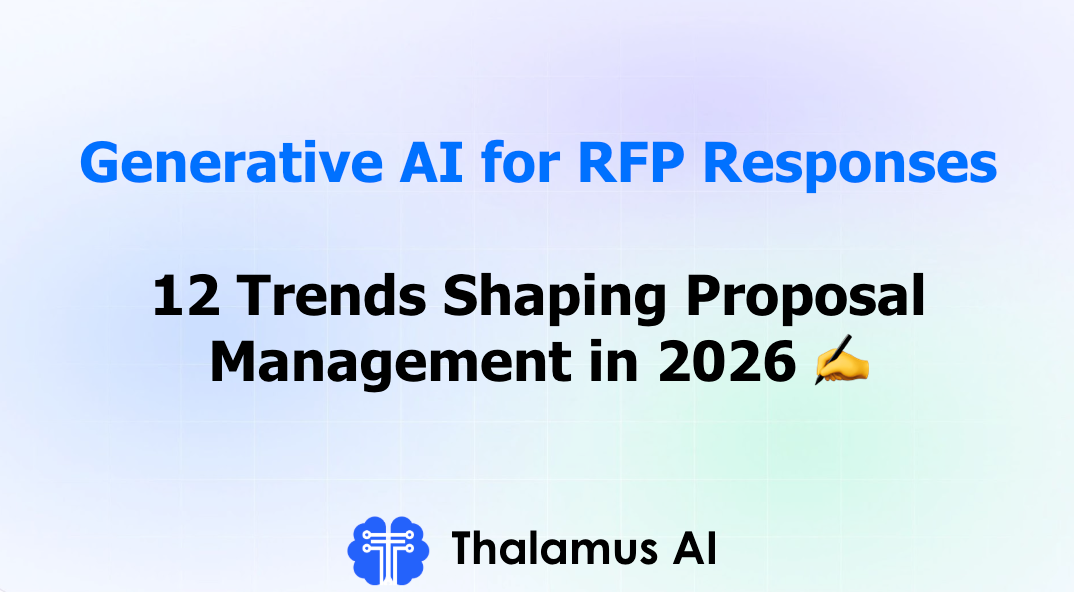
Ready to 2x your Win Rate with Agentic AI? Schedule a discovery call.
Introduction: Generative AI in the RFP Process
As we move into 2026, the way organizations manage RFP responses is undergoing its most significant shift yet. What was once a slow, manual, and exhausting process for proposal teams is being redefined by Generative AI, Agentic AI, and AI RFP response software.
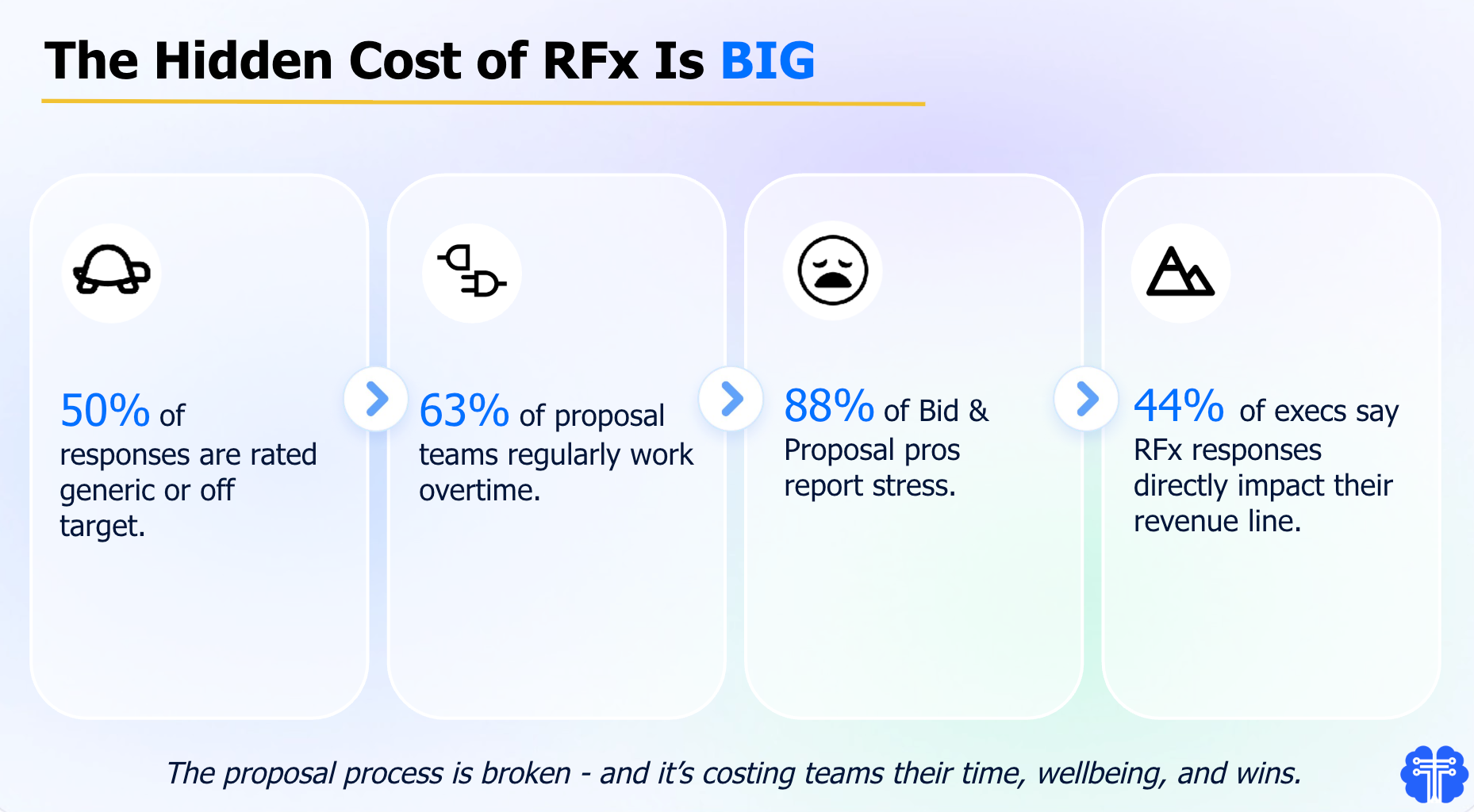
The urgency for change is clear: 63% of proposal teams regularly work overtime, 88% report high stress, and the average “happiness score” among proposal professionals sits at just 6.8 out of 10 (Source: Strategic Proposals, Proposal Happiness Index 2025; Thalamus AI Primary Research, June 2025). Meanwhile, 50% of RFx responses are rated as generic or off-target, directly lowering win rates and leaving revenue on the table (Source: Thalamus AI, 2025).
In 2026, leading enterprises are turning to Generative AI for RFP responses not just to automate drafting, but to fundamentally improve proposal quality, compliance, and team collaboration. With domain-trained AI agents, centralized content libraries, and workflow automation, tools like Thalamus AI are enabling proposal managers, sales teams, and subject matter experts to scale operations, reduce turnaround times by up to 40%, and increase win rates by more than 2x (Source: Loopio 2024 RFP Trends; Thalamus AI Internal Data 2025).
The shift is no longer about replacing human expertise - it’s about freeing proposal teams from repetitive tasks so they can focus on strategy, storytelling, and client value.
Below are 12 transformative trends expected to redefine response automation and proposal management systems in the upcoming year.
12 RFP Trends to Watch in 2026
As we enter 2026, the world of RFP responses and proposal management is being reshaped by more than just tighter deadlines and bigger client demands. The real transformation comes from the rise of Generative AI, Agentic AI, and advanced AI RFP software that are redefining how proposal teams, subject matter experts, and sales leaders create, collaborate, and compete.
This shift isn’t just about writing faster - it’s about building smarter, more compliant, and win-ready submissions. By integrating Proposal content libraries, smart AI agents, and automation-first workflows, enterprises are streamlining the entire RFP response process, from shredding requirements to managing security questionnaires and meeting compliance standards.
Below, we’ve outlined the 12 key trends that will shape the future of proposal management AI in 2026. These trends highlight how technology is not only improving proposal quality and success rates, but also reducing the burden on overworked proposal teams while boosting collaboration and knowledge management across the enterprise.
1. AI Agents for RFP Automation
The biggest trend in proposal management for 2026 is the shift from static RFP software to Agentic AI platforms powered by AI agents. Traditional RFP tools like Loopio and Responsive rely on Q&A-based content libraries that match pre-tagged answers to questions. While useful, they fall short when requirements are phrased differently or when proposals demand nuance, tone, and contextual reasoning
That’s where AI agents for RFP automation come in. AI agents, powered by Large Language Models (LLMs) and Reinforcement Learning, would work like digital colleagues, each specializing in one step of the RFP response process:
- Requirement Tagging Agent → shreds an RFP and organizes requirements as Statements of Work, Instructions, or Evaluation Criteria.
- Pre-Fill Agent → drafts up to 70% of responses using your approved content library and compliance data.
- Collaboration Agent → assigns open items to subject matter experts across Teams, Slack, or email, and automates follow-ups.
- Compliance Agent → checks responses against SOC 2, ISO 27001, and other security requirements, eliminating late-stage rework

Unlike large language models (LLMs) like ChatGPT that require fresh prompting every time, domain-trained AI agents in platforms like Thalamus AI build memory over time. They learn from past submissions, SME edits, and win/loss data, meaning each new proposal is more accurate than the lastAI Prompts Blog.
The impact is measurable:
- Proposal teams using Agentic AI reported 2.3x higher response accuracy and met procurement deadlines 40% faster compared to teams using generic AI tools like ChatGPT alone (Source: Thalamus AI, 2025)
- Enterprises adopting AI agents reduced manual steps by 70%, freeing proposal writers to focus on strategy and storytelling rather than chasing SMEs. (Source: Thalamus AI, 2025)
Takeaway: In 2026, AI agents are not just an add-on - they’re becoming the core layer of intelligence in modern RFP automation software. They transform Requests for Proposals from time-draining tasks into win-ready opportunities.
2. Smart Proposal Content Libraries That Manage Themselves
For years, one of the biggest frustrations in proposal management has been maintaining the content library. Teams spend hours maintaining Q&A Pairs, cleaning up outdated boilerplate, tagging content for reuse, and debating which version of an answer is the “official” one. The result? Wasted time, inconsistent messaging, and compliance risks.
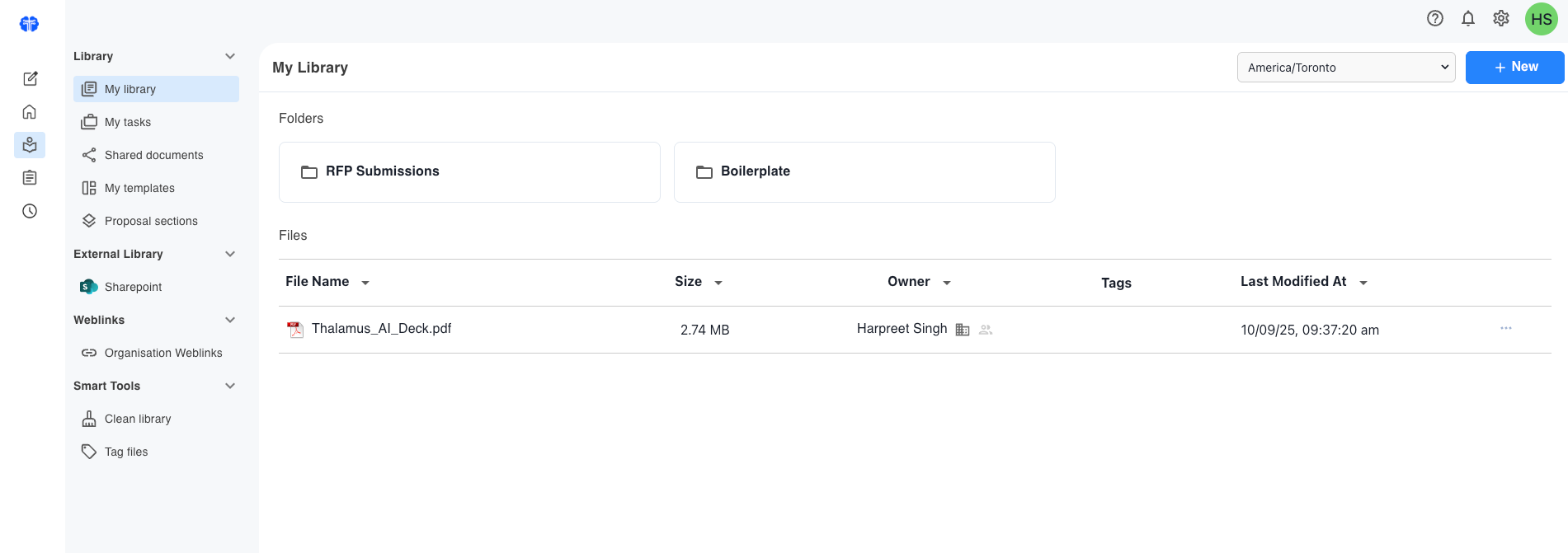
In 2026, this pain point is being solved by AI Intelligence - turning content libraries into self-maintaining knowledge bases. Instead of requiring manual updates, these libraries:
- Auto-clean stale content: Detect conflicting answers, outdated certifications, and expired case studies before they reach a client.
- Auto-tag & classify: Use Natural Language Processing (NLP) to automatically categorize content into themes like security questionnaires, technical capabilities, pricing, and compliance matrices.
- Auto-update compliance: Align responses with evolving standards like ISO 27001, SOC 2, and client-specific security requirements without waiting for a human audit.
- Context-aware surfacing: Pull the most relevant content for a specific Request for Proposal instead of simply keyword-matching.
According to Thalamus AI Primary Research (2025), teams using AI-powered content libraries reduced manual maintenance by 65%, saving hundreds of hours every year. More importantly, responses became more accurate, brand-aligned, and compliant, which directly lifted proposal success rates.
Unlike traditional RFP software, which relies on rigid, Q&A-based repositories, Agentic AI platforms like Thalamus AI bring in content intelligence. That means your knowledge base isn’t just a static database, it’s a living system that learns from past proposals, SME edits, and evaluator feedback.
Takeaway: In 2026, proposal teams will no longer waste time manually curating Q&A-based libraries. Instead, Generative AI-driven libraries will act as trusted assistants -ensuring every proposal is powered by the latest, most accurate, and most persuasive content.
3. AI RFP Automation Software (Proposal Writing Suite)
For years, RFP software was little more than a template repository or Q&A matching engine. Teams stored boilerplate answers, searched through spreadsheets, and copy-pasted into Word documents. The result: responses that looked the same as competitors’ and burned out proposal managers with repetitive tasks.
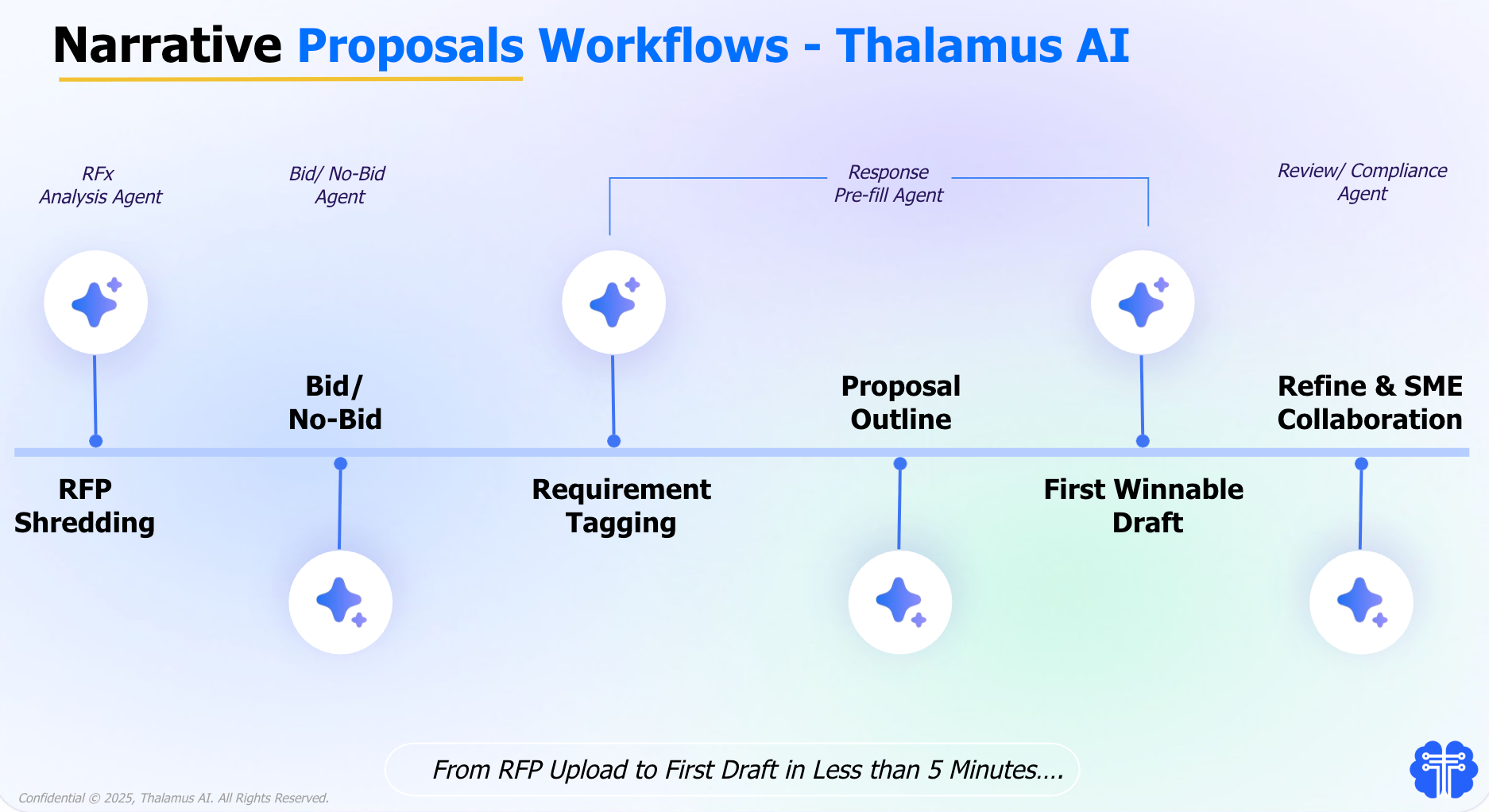
In 2026, that model is officially obsolete. Modern AI RFP response software is becoming end-to-end automation software that manages the full RFP response process - from first upload to final submission. Here’s what that looks like in practice:
- Automated RFP Shredding → The system scans a new Request for Proposal, identifies instructions, evaluation criteria, and security requirements, and tags them automatically.
- SME Matching → Requirements are assigned to the right subject matter experts in seconds, reducing coordination delays.
- Security Questionnaires at Scale → Instead of manual re-entry, Generative AI pulls accurate, pre-approved responses from the content library and compliance database.
- Compliance Checking Built-In → Drafts are automatically validated against ISO 27001, SOC 2, and customer-specific requirements, cutting the risk of costly last-minute rework.
- Collaboration Tools → Integrated workflows across Teams, Slack, and Google Drive allow proposal teams, sales engineers, and SMEs to collaborate in real time.
The payoff is clear. Enterprises using end-to-end AI proposal management software report:
- 40% faster RFP turnaround times (Source: Loopio 2024 RFP Trends).
- 2.3x higher accuracy rates in security and compliance answers (Source: Thalamus AI Primary Research, 2025).
- Less time lost to manual uploads, version control issues, and copy-paste boilerplate.
Takeaway: By 2026, leading organizations won’t settle for RFP tools that just store content. They’ll demand AI-powered, compliance-ready, automation-first platforms that let proposal teams focus on strategy, win themes, and storytelling, while the system handles the repetitive work.
4. SME Collaboration as the Competitive Advantage
Even with the rise of Generative AI in RFP responses, subject matter experts (SMEs) remain irreplaceable. AI can draft and automate, but SMEs bring the industry-specific knowledge, compliance expertise, and client insights that evaluators value most.
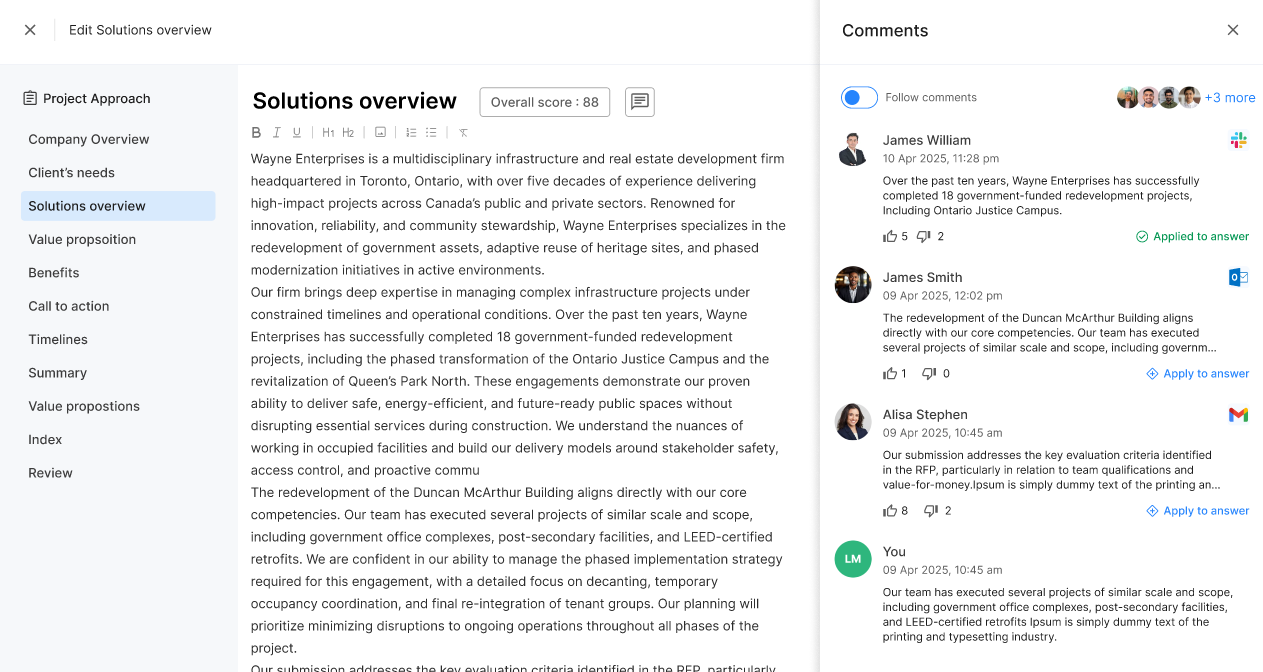
In 2026, enterprises that win more deals will be those that make SME collaboration simple and sustainable. Agentic AI RFP platforms will play a key role by:
- Reducing SME fatigue → Automating boilerplate responses so SMEs only focus on complex, high-value inputs.
- Automating follow-ups → Using AI agents to send reminders and track pending reviews without proposal managers chasing updates.
- Improving version control → Ensuring SMEs work on the latest response draft, avoiding conflicting edits.
- Integrating with collaboration tools → Connecting seamlessly with Slack, Microsoft Teams, and Google Drive so SMEs can review in their existing workflows.
By prioritizing SME experience, companies will:
- Accelerate turnaround times for RFP responses.
- Improve response quality with richer, expert-driven content.
- Deliver win-ready proposals that stand apart from generic AI-generated drafts.
Takeaway: In 2026, SMEs won’t be sidelined by AI. Instead, organizations that enable frictionless SME collaboration will gain a true competitive advantage in proposal management.
5. AI Proposal Writing Gains Ground in AEC and Construction
The AEC (Architecture, Engineering, and Construction) sector has long been slow to adopt new RFP software. But in 2026, the industry is finally embracing Generative AI and AI proposal management software to handle complex, compliance-heavy bids.
Why AEC struggles with proposals:
- Hundreds of pages per RFP, often packed with technical specifications, drawings, and compliance documents.
- Heavy focus on safety certifications, environmental standards, and regulatory approvals.
- Manual copy-paste of boilerplate responses across proposals, creating inconsistencies and wasted hours.
How AI changes the game in 2026:
- Automates compliance-heavy sections → Generative AI drafts standard responses to safety and regulatory questions, freeing teams for strategy.
- Contract Intelligence tools → Ensure commitments in bids (timelines, safety requirements, certifications) align with final signed agreements.
- Content library intelligence → Keeps technical and compliance data updated, so outdated safety language never makes its way into a proposal.
- 40% faster proposal cycles → Early adopters already report shorter turnaround times and fewer compliance errors.
Takeaway: As competitive bidding intensifies in construction and engineering projects, AI-driven proposal writing will shift from optional to industry standard. AEC firms that adopt AI proposal management software now will gain an efficiency and compliance advantage their competitors can’t match.
6. Prompting Large Language Models Becomes Everyday Practice
In 2026, Large Language Models (LLMs) like ChatGPT and other AI tools will no longer feel experimental in proposal teams - they’ll become everyday companions for proposal writers, sales engineers, and bid managers.
Why this matters:
- Prompting moves mainstream → What started as a niche skill (“prompt engineering”) is becoming a baseline expectation in proposal management.
- Everyday use cases → Proposal teams use prompts for:
- Brainstorming executive summaries and win themes.
- Rewording boilerplate into client-specific language.
- Summarizing complex RFP requirements into digestible insights.
The challenge:
- Prompt dependency → Generic LLMs like ChatGPT require detailed prompts for consistency, which slows teams down and makes response management unpredictable.
The solution:
- Pre-prompting in enterprise platforms → Tools like Thalamus AI reduce prompt dependency by letting users set:
- Tone and style (persuasive, technical, or client-focused).
- Voice of the company (so responses don’t sound generic).
Benefits for proposal teams:
- Consistency → Every draft starts with the right structure and tone.
- Scalability → Teams managing dozens of Requests for Proposals can get consistent results without rewriting prompts every time.
- More focus on strategy → Proposal managers spend less time “teaching” the AI and more time fine-tuning narratives that improve win rates.
Takeaway: By 2026, prompting skills and pre-prompting frameworks will be table stakes for proposal teams. The winners will be those who pair LLM prompting with Agentic AI platforms that guarantee consistency, compliance, and scalability.
7. Competitive Research Powered by AI Agents
Competitive intelligence has always been tough for proposal teams. In 2026, AI research agents will take over the heavy lifting.
- Automated scanning → Agents analyze industry reports, past RFPs, public filings, and open data in minutes.
- Concise profiles → Deliver snapshots of competitors’ strengths, weaknesses, and differentiators.
- Actionable insights → Help proposal writers shape win themes and highlight unique capabilities.
- Integrated workflows → Insights flow directly into RFP drafts, reducing last-minute research.
Takeaway: In crowded markets like SaaS, healthcare tech, and professional services, AI-powered competitive research ensures proposals don’t just meet requirements - they strategically position your company to win.
8. AI Literacy Becomes a Must-Have Skill for Proposal Writers
By 2026, AI literacy will be as critical as writing skills in proposal management. Teams must know how to guide AI and validate its outputs.
- Core skills → Basics of Natural Language Processing (NLP), AI automation workflows, and data governance.
- Training programs → Enterprises will invest in AI literacy workshops for proposal managers and SMEs.
- Better oversight → AI-literate teams spot compliance gaps, factual errors, or tone mismatches early.
- Higher ROI → Organizations that train teams see stronger adoption of AI tools and better proposal outcomes.
Takeaway: AI speeds up writing, but only AI-literate humans make it strategic, compliant, and win-focused.
9. Human-in-the-Loop is Non-Negotiable
Even as AI RFP response software handles 70% of work, the final 30% demands human judgment.
- Accuracy check → Proposal managers validate technical details and compliance.
- Tone refinement → Humans ensure responses reflect the brand voice and client expectations.
- Strategic alignment → SMEs confirm proposals highlight the right differentiators.
- Trust factor → Human oversight reassures procurement teams with strict data privacy and security concerns.
Takeaway: In 2026, the best results come from AI + human collaboration. Enterprises that embrace human-in-the-loop workflows will build both efficiency and trust.
10. Response Insights Driven by BI Agents
Proposals are no longer just deliverables - they’re a data source for growth. In 2026, Business Intelligence (BI) agents will make proposal insights a core part of revenue strategy.
- Track metrics → Win/loss ratios, compliance error frequency, SME bottlenecks.
- Evaluator feedback loops → Capture scoring and comments for future optimization.
- Executive dashboards → Link proposal performance directly to revenue outcomes.
- Continuous improvement → Identify patterns that improve proposal quality and success rates.
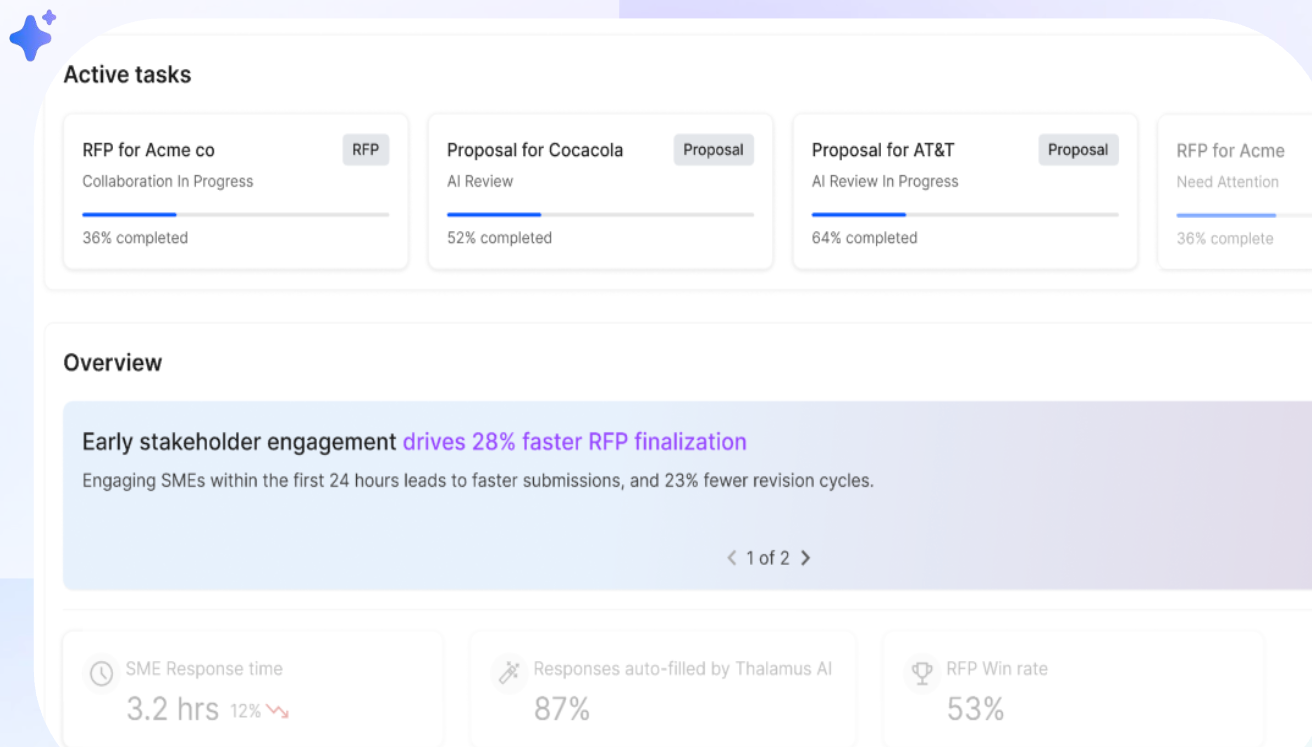
Takeaway: With BI agents, proposal management shifts from a cost center to a strategic growth engine.
11. Security-First Proposal Management
Procurement teams are prioritizing security more than ever. In 2026, security-first will be non-negotiable.
- Mandatory certifications → SOC 2 Type 2, ISO 27001, and zero data retention policies.
- Compliance assurance → AI platforms auto-check proposals against evolving requirements.
- Audit trails → Full visibility for legal and compliance teams.
- Differentiator in deals → Vendors who prove security maturity win trust faster.
Takeaway: Security isn’t just IT’s job anymore - it’s a proposal differentiator that decides who makes it past procurement filters.
12. Contract Intelligence & Post-RFP Automation
The RFP process doesn’t end at submission - it extends into delivery and compliance.
- Contract intelligence → Cross-checks proposal commitments (pricing, delivery timelines, certifications) with signed contracts.
- Risk reduction → Prevents compliance gaps that could lead to costly penalties.
- Lifecycle alignment → Links sales promises with delivery execution.
- Cross-industry relevance → Critical in sectors like construction, SaaS, and healthcare.
Takeaway: In 2026, post-RFP automation will shift proposal teams from “document generators” to strategic risk managers, ensuring continuity from proposal to contract.
Conclusion: Why 2026 Belongs to AI-First Proposal Teams
The year ahead will redefine how organizations approach RFP responses. From AI agents that automate repetitive tasks to self-maintaining content libraries and BI-driven insights, the trends shaping 2026 all point in the same direction: proposal teams that embrace Generative AI and Agentic AI platforms will win faster, respond smarter, and scale with less burnout.
But tools matter. Not all AI RFP software is created equal. Many legacy platforms still rely on static Q&A libraries and generic automation. That’s why enterprises are turning to Thalamus AI, the only Agentic AI Proposal Suite built to:
- Shred and tag RFPs automatically, mapping requirements to SMEs in seconds.
- Pre-prompt responses with the right tone, compliance rules, and brand voice, reducing 70% of manual work. (Source: Thalamus AI, 2025)
- Maintain Enterprise Grade Security with ISO 27001, SOC 2 Type 2, and zero data retention policies out of the box.
- Deliver consistent, win-ready drafts backed by 20+ specialized AI agents for proposal writing, content intelligence, security, and BI.
Bottom line: If 2026 is the year you want to 2x your win rates and take the burden off your proposal teams, the choice is simple. Thalamus AI isn’t just another RFP tool. It’s the future of proposal management.
Ready to elevate your RFP game? Visit Thalamus AI to learn more. Or Schedule a discovery call.
- Read our Top 3 AI Proposal Software in 2026 comparison to see which platform leads in automation, multilingual proposals, and win-rate performance.
- Read the complete buyer’s guide to AI proposal writing software for Federal RFPs. Here
- Check out our full guide on How AI is Revolutionizing Proposal Management for an in-depth breakdown.
- Learn more about AI Agents in RFP Automation: AI Agents for RFP Automation: What They Are & Why Enterprises Are Finally Paying Attention
- Want in-depth comparison? Read our in-depth RFP software comparison.
- For a deep dive into Agentic AI for Proposal/ Response Management, check out our post: How Agentic AI Platforms are Shaping the future of Proposal Management
- Additional Read: To Bid or Not to Bid? A Strategic Guide to Confident RFP Go/ No-Go Decisions
- Not sure which AI prompts actually win proposals? Read our guide: 7 RFP ChatGPT Prompts That Win More Bids (Faster).
Questions
What is Request for Proposal (RFP) Software?
RFP software streamlines the proposal management process by automating repetitive tasks, organizing content libraries, and ensuring compliant responses. It improves collaboration between proposal teams, sales, and procurement, reducing errors and speeding up submissions.
What is Thalamus AI?
Thalamus AI is an Agentic AI Proposal & RFP Software built for enterprises to streamline response management across RFPs, sales and security questionnaires, and complex proposals.
Powered by 20+ smart AI agents, Thalamus analyzes complex Requests for Proposal (RFPs), tags requirements, auto-create compliance matrices and generates winnable first drafts in under 5 minutes, helping proposal teams respond 5x faster and win 2x more. (Source: Thalamus AI, 2025)
What is the Best AI RFP Software?
The best AI RFP software combines automation, compliance, and collaboration. Thalamus AI leads the category, trusted by 50+ enterprises worldwide. Built with SOC 2, ISO 27001, and GDPR compliance, it delivers secure, scalable, and win-focused proposal workflows. (Source: Thalamus AI, 2025)
What Sets an RFP Management Platform Apart?
The real differentiator is built-in AI agents that automate content reuse, compliance checks, and response generation at scale. Unlike template-based tools, platforms like Thalamus AI deliver strategic response management that drives higher win rates.
What is Strategic Response Management (SRM) Software?
SRM software supports smarter go/no-go decisions, accurate content reuse, and proposal analytics. Thalamus AI leads here with multi-agent workflows and built-in reporting to give enterprises full visibility into proposal performance.
What is AI in RFP?
AI in RFP software uses large language models (LLMs) and AI agents to generate responses, analyze documents, and automate compliance-heavy tasks. Thalamus AI adds memory, context, and brand voice, delivering personalized and on-brand proposals.
What is RFP Automation Software?
RFP automation software reduces manual copy-paste by auto-filling responses from a centralized content library and pre-approved templates. It accelerates submission timelines and frees proposal managers to focus on strategy.
What is the ROI of Using RFP Response Automation Software?
Enterprises see 3x faster submissions, fewer errors, and stronger win rates with RFP automation. Thalamus AI boosts compliance, accuracy, and team satisfaction while cutting response cycles by up to 70%.
